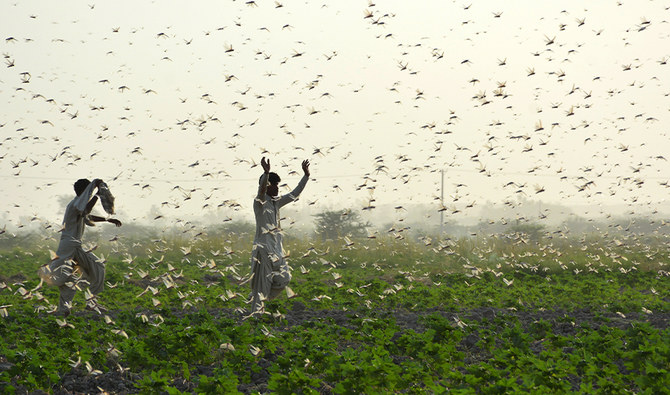ISLAMABAD: First the idea was to feed them to chickens, now the plan is to grind them into fertilizer — as more locust swarms threaten Pakistan’s crops, a project aims to test ways of killing and using the voracious pests for the benefit of local communities.
Pakistan’s worst locust infestation in about 30 years started in June 2019, when the insects came over from Iran in a surge climate experts link to changing conditions conducive to the spread of the insects.
This summer, the locusts are breeding locally, says the Pakistani government, which is trying to head off another attack by spraying pesticides on newborn locusts — called hoppers because they cannot fly — in desert areas on the Indian border.
But worries that the pesticides could be harmful to plants, animals and people have motivated researchers to seek chemical-free methods of cutting the locust population.
“We wanted to come up with a locust control project that would be environmentally friendly and sustainable,” said biotechnologist Johar Ali.
For Ali and his colleague Muhammad Khurshid, who was working for the food ministry at the time, the answer was chicken feed.
In February, the state-run Pakistan Agricultural Research Council (PARC) sent Ali and Khurshid, now with the privatization ministry, to implement a three-day trial in Punjab province in eastern Pakistan.
During an infestation this spring, villagers in Okara district plucked locusts — which are largely immobile at night — off trees in a nearby forest, gathering about 20 tons of the flying insects.
The project team bought the bugs for 20 Pakistani rupees ($0.12) a kilo, then sold them to a nearby processing plant, which dried them and mixed them into chicken feed, Ali said.
The aim was to help control the locust surge in forested and heavily populated areas, where widespread pesticide spraying is not possible, while also generating income for communities hit by the swarms.
“It’s an out-of-box solution,” Ali said. “It could easily be scaled up in our populated rural areas. Yes, in our desert areas where locusts breed, chemical sprays make sense — but not in areas where we have farms with crops, livestock and people.”
In June, the government shifted the focus from chicken feed to compost, after PARC decided fertilizer was a safer and more feasible use for the insects.
Last month, communities living in the desert areas of Cholistan, Tharparkar, Nara and Thal were trained on how to catch locusts as they head there to breed for the season.
The next step is to look at how to turn the pests into organic fertilizer, explained PARC chairman Muhammad Azeem Khan.
By providing a “slow and continuous” release of nutrients, the compost could help farmers increase their yields by 30% and cut their use of chemical fertilizer in half, he said.
PESTICIDE WORRIES
Pakistan’s current locust problem started with what Muhammad Tariq Khan, technical director of the food security ministry’s plant protection department, called a “climate change-induced international locust crisis” in Yemen and East Africa.
“Two big cyclones in 2018 dumped enough water in a desert area called the Empty Quarter in the Arabian Peninsula for three generations of locusts to grow undetected,” he said.
Torn by civil war, Yemen was unable to focus on exterminating the pests, which lay their eggs beneath the soil, and so “they came up like a bomb,” Khan said.
July’s monsoon rains arrived 10 days earlier than usual in Pakistan, creating moist soil conditions favorable for the locusts to breed in the border desert area, Khan said.
Swarms are also expected to arrive soon in Pakistan from Somalia, he told the Thomson Reuters Foundation.
The UN Food and Agriculture Organization estimates losses to agriculture from locusts this year could be as high as 353 billion rupees ($2.2 billion) for winter crops like wheat and potatoes and about 464 billion rupees for summer crops.
“You can’t eradicate locusts, but you can control them. In this situation we have to rely on chemicals,” Khan said.
So far, insecticide-spraying operations have been carried out in 32 affected districts — both desert and cropping areas — spread over 2.6 million acres (about 1 million hectares).
But Shan Junejo, who grows cotton, wheat and rice on several hundred acres in Sindh, said he and many other farmers worry the pesticides could be bad for the environment, as well as humans.
“The government needs to look into procuring eco-friendly pesticides – otherwise entire ecosystems are going to be affected,” he said.
FEED TO FERTILISER
The danger posed by pesticides was one reason PARC decided to use the locusts to boost crops instead of feeding chickens.
Pakistan’s pesticide-spraying operations had made it impossible to ensure the locusts eaten by poultry would be chemical-free, said PARC’s Azeem Khan.
“Sprayed locusts, if used as feed, are a threat to human health,” he said.
The new project, which has been approved by the National Locust Control Center, will entail buying living and dead locusts from local communities at 25 rupees per kilo.
The bugs will then be mixed with bio-waste such as manure and vegetation to turn them into compost, Azeem Khan said.
PARC is now analizing samples of dead and decomposing locusts that have been sprayed with insecticide to assess the levels of chemical residue on them, he noted.
The PARC chairman said the government had earmarked $15 million for the project, with just over half going to the communities and the rest toward compost-processing.
Locust expert and independent consultant Chaudhry Inayatullah warned such interventions may have little effect in controlling millions of desert locusts once they start swarming.
“The time to trap and kill (locusts) is during their solitary phase in winter, when there are just four or five individuals per acre,” he said.
When locust swarms start spreading across borders, breeding and looking for food, he said, “monitoring their movement pattern is essential and (insecticide) spraying — both ground and aerial — is the only solution to control them.”
















